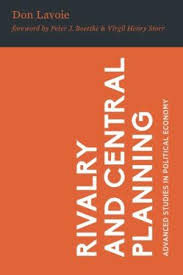

 |

|

The average rating for Rivalry and central planning based on 2 reviews is 4.5 stars.
Review # 1 was written on 2021-02-07 00:00:00 Andre Chagas Andre ChagasGood stuff. I'm taking a class on Austrian economics as an independent study. I know I'm predisposed to ideas that seem libertarian-ish, and I like the novelty of interesting, new arguments. Thoughts: I think the recontextualization of the calculation debate is an interesting thing to devote resources too. It's not really something I've learned much about in my other economics classes. I'm not really sure why, but reading this, and its foil, the standard account, are interesting. I think the book was pretty generous to Marx, and intellectual generosity is something to be valued, and something that I think made this book a page turner. I also enjoyed the chapter on Mises because it gives something in between a birds eye view, and getting too stuck in the weeds. |
Review # 2 was written on 2019-08-25 00:00:00 Matthew Mauser Matthew MauserWritten with stellar clarity, Lavoie's re-examination of the Socialist Calculation Debate is both historically interesting and forward-looking in its confident reassertion of the modern Austrian perspective. Sure, it doesn't bring much new to the table, since it relies exclusively on the Mises-Hayek argument, but it surveys the scene with competence and plants its flag with bravado. The central argument of the book is that the Austrian theory of the competitive market process, which allegedly underlies both Mises's and Hayek's theses in the debate, is a dynamic process theory of change that cannot be captured by neoclassical equilibrium models based on static assumptions of given knowledge, given technologies, given resource availability, etc. The failure of socialist calculation depends upon a fuller understanding of the role of entrepreneurship and institutions in managing risk, uncertainty, dynamic change, complex adaptation, etc. According to the author, the failure of the market socialists to fully understand the theory, and the failure of the Austrians to fully articulate it, led to a general state of impasse in the historical debate. For the most part, the author does a pretty good job explaining all sides of the argument despite his professed love of and commitment to the Austrian cause. But I will subtract one star for the excessively generous treatment by which the author handles the Austrian side of the argument according to which they were always one step ahead of the opposition and never strayed from the one true path. The flip-side of this, of course, is the author's ungenerous treatment of the other side (although curiously not of Marx, who is given a VERY generous reading as a fellow disequilibrium theorist against the neoclassical mainstream!). This is reflected in the book's failure, in the middle act, to make a convincing positive case for the market socialist argument. This, however, is the only major shortcoming in an otherwise excellent and clear treatise. The book is a very good introduction to and summary of the debate from the Austrian side. |
CAN'T FIND WHAT YOU'RE LOOKING FOR? CLICK HERE!!!